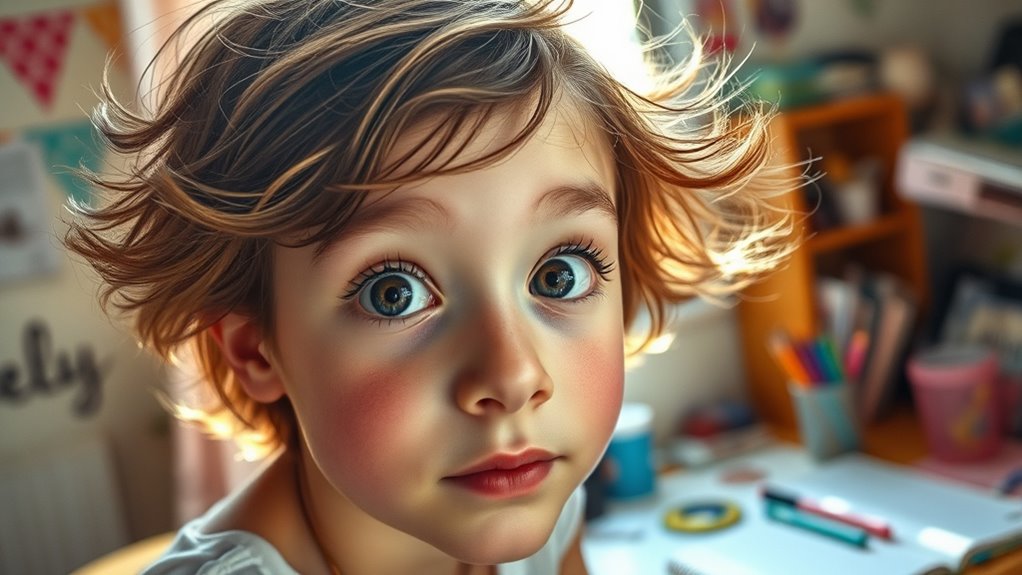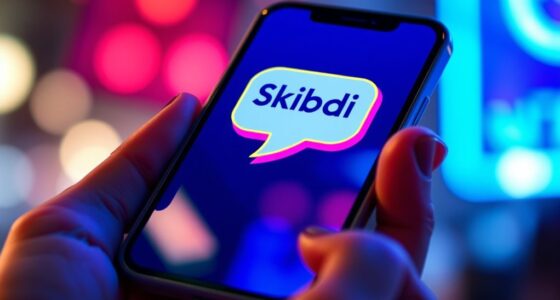“Delulu” is a playful slang term from online fan communities that describes someone who’s disconnected from reality because of unrealistic fantasies or obsessive daydreams about celebrities or ideal scenarios. It’s often used humorously to tease friends or acknowledge exaggerated hopes, especially in K-pop or Korean drama fandoms. While it can highlight over-optimism, it’s mostly lighthearted. If you’re curious, you’ll find out how this term shapes fan culture and social interactions.
Key Takeaways
- “Delulu” is slang for being overly idealistic or disconnected from reality, often regarding fantasies about celebrities.
- It originated online, especially within K-pop and Korean drama fandoms, to describe exaggerated fan behaviors.
- The term is used humorously to tease or acknowledge unrealistic daydreams or obsessive thoughts.
- It signifies crossing the line from healthy admiration to delusional or obsessive thinking.
- Recognizing “delulu” helps distinguish playful fantasies from problematic fixation, promoting mental health awareness.
The Origin of the Term “Delulu”
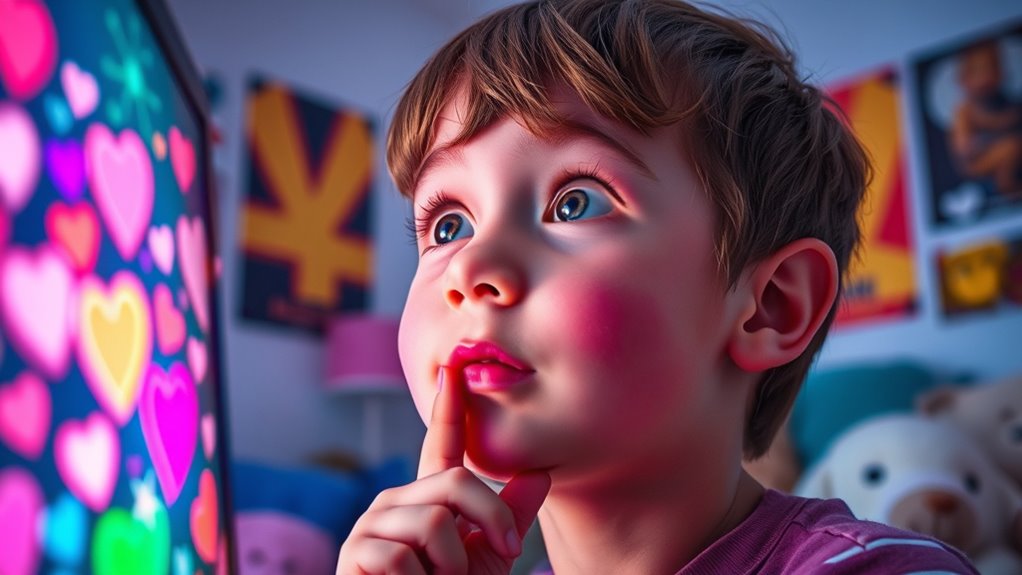
Have you ever wondered where the term “delulu” comes from? It originated from online communities and social media, where slang evolves quickly. Originally, it was used to describe people who are overly idealistic or disconnected from reality, often in a humorous way. The term gained traction among fans of K-pop and Korean dramas, where fans sometimes develop intense, unrealistic fantasies about idols or celebrities. While the slang is playful, it can also touch on mental health concerns, as some individuals struggle with balancing their fantasies and real life. Social media amplifies this behavior, making it easy to share delusional ideas or perceptions. Ultimately, “delulu” reflects how online culture shapes language, blending humor with a subtle nod to mental health awareness. Additionally, the popularity of romantic fantasies in online fandoms has contributed to the widespread use of the term, highlighting how media influences slang evolution.
How “Delulu” Is Used in Online Communities

You might notice that “delulu” is frequently used in online communities to describe fans who hold onto exaggerated or unrealistic beliefs about their favorite celebrities. In these spaces, people often use the term humorously or critically, reflecting how obsession can blur reality. While it highlights passionate devotion, it can also impact mental health if fans become too entangled in their fantasies. Online etiquette plays a role, too; some communities encourage respectful discussion, while others may mock or dismiss delusional ideas. Recognizing the line between admiration and delusion helps maintain a supportive environment. Overall, “delulu” serves as a way for users to comment on the intensity of fandom, often with a mix of humor and caution about mental health. The term also underscores the importance of inner wisdom in navigating emotional attachment and maintaining personal well-being.
The Difference Between Being Dreamy and Delulu

You might find yourself daydreaming about a perfect future, which is harmless and rooted in imagination. However, when those beliefs clash with reality and seem overly optimistic, that’s when being delulu comes into play. Recognizing the difference helps you stay grounded while still enjoying a bit of escapism. Being aware of emotional distance signs can also help you identify when your perceptions may be influenced by delulu tendencies.
Imagination vs. Reality
Ever wondered how to tell if someone’s dreamy thoughts are harmless imagination or a sign of being delulu? It’s important to distinguish between healthy daydreaming and delulu tendencies that can impact mental health. When your fantasies clash with reality, it might be a red flag. Social media often blurs this line, making it easy to confuse wishful thinking with delusional beliefs. Here are signs to watch for:
- Constantly denying real-world facts
- Living in an idealized version of life
- Ignoring feedback or reality checks
- Relying on social media validation over genuine connections
Understanding this difference helps protect your mental health and keeps your imagination fun without crossing into delulu territory. Stay grounded, and recognize when fantasy becomes problematic.
Escaping Daily Stress
Many people turn to daydreaming as a way to escape the stresses of daily life, seeking solace in imagined scenarios that bring comfort or excitement. This mental escape can temporarily boost your mood and protect your mental health by providing a break from real-world pressures. However, social media often amplifies these tendencies, showing idealized lives that inspire dreamy illusions or delulu thinking. While indulging in harmless fantasies can be healthy, crossing into delulu territory might lead you to disconnect from reality. Being aware of the difference helps you manage stress without losing touch with what’s real. Dreaming can be a helpful coping mechanism, but it’s essential to stay grounded and not let fantasies interfere with your mental health or daily responsibilities. Recognizing how dog names can reflect personality traits might also help you stay connected to reality while exploring your creative side.
Overly Optimistic Views
While dreaming about positive futures can boost motivation, there’s a fine line between healthy optimism and delulu thinking. Being dreamy involves setting ambitious goals and believing in possibilities, but delulu crosses into unrealistic territory. Cultural implications influence how these views are perceived; some cultures celebrate idealism, while others value practicality. The linguistic evolution of slang like “delulu” reflects this shift, highlighting how society interprets optimism. To distinguish between the two, consider:
- Are your beliefs grounded in evidence?
- Do your expectations align with reality?
- Are you ignoring warning signs?
- Is your optimism affecting your decision-making?
Recognizing this difference helps you stay motivated without falling into delulu. It’s a nuanced balance, shaped by cultural norms and evolving language, that determines whether your outlook remains inspiring or becomes overly optimistic. Additionally, understanding eye patch benefits and how they influence appearance can remind us that improvements often require realistic expectations and consistent effort.
Examples of “Delulu” Behavior in Pop Culture
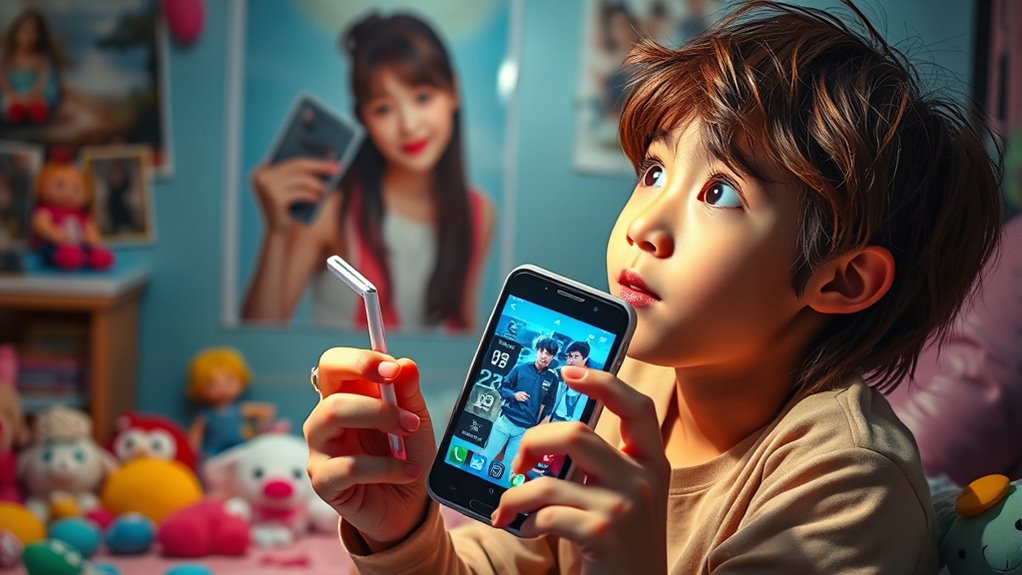
You’ve probably seen fans fantasize about celebrities as if they’re more than just stars. Some get obsessive over interactions with their idols, hoping for a personal connection. Others overreact to rumors, believing every detail is true—these are classic examples of “delulu” behavior in pop culture.
Fantasizing About Celebrities
Ever wonder how some fans take their admiration for celebrities to an extreme? It’s all about those wild fan fantasies that blur reality. People with a strong celebrity obsession often imagine elaborate scenarios where they’re part of the star’s life, even if it’s far from real. These delulu behaviors show up in pop culture through:
- Writing detailed love letters to celebrities they’ve never met
- Believing they’re destined to be together someday
- Creating fake social media interactions that never happened
- Daydreaming about winning a meet-and-greet unexpectedly
These fantasies feed into a desire for closeness and validation, making delulu behavior more about emotional escape than fact. It’s a clear sign of how deep fan obsession can get when fantasies become a form of personal fulfillment. Sometimes, this kind of imagination even overlaps with fan tuning, where fans modify their perceptions to feel closer to celebrities.
Obsessive Fan Interactions
Obsessive fan interactions often showcase just how far delulu behavior can go in pop culture. When your celebrity obsession turns into constant messaging, stalking social media, or creating elaborate theories, you’re crossing into delulu territory. Fan devotion can be intense, leading some to believe they have a personal connection with celebrities or that their actions influence their lives. These behaviors reflect a deep, sometimes unhealthy, attachment fueled by idealized images and desire for closeness. You might find yourself interpreting every move or comment as a sign, ignoring boundaries and reality. Such obsessive interactions highlight how delulu behavior blurs the line between admiration and fixation, revealing just how far some fans are willing to go in their devotion. Recognizing boundaries and reality is essential to maintaining healthy admiration without crossing into unhealthy obsession.
Overreacting to Rumors
Why do fans often overreact when rumors swirl about their favorite celebrities? It’s because their attachment fuels intense emotions, leading to delulu behavior. You might see fans jumping to conclusions or creating stories based on tiny clues, especially when it involves their celebrity crushes. These overreactions are often driven by daydreaming habits, imagining perfect scenarios or relationships that aren’t real. In pop culture, examples include fans believing a celebrity is secretly dating someone or ignoring obvious facts. This intense emotional investment makes it hard to stay grounded. To spot delulu behavior:
- Believing every rumor without question
- Interpreting innocent actions as romantic
- Defending celebrities obsessively
- Overanalyzing social media posts
- Cybersecurity vulnerabilities can sometimes be exploited to spread false information or manipulate fans’ perceptions.
The Playful Tone Behind “Delulu”

The playful tone behind “delulu” stems from its lighthearted and humorous use in online conversations. It’s often used to tease friends or acknowledge when someone is daydreaming or overthinking, adding a sense of camaraderie. This slang’s evolution reflects how pop culture references influence language, making terms like “delulu” feel trendy and relatable. Its humorous intent helps keep interactions fun, even when poking fun at someone’s unrealistic beliefs or fantasies. By using “delulu” playfully, you’re signaling that you’re not criticizing but sharing a laugh. This tone fosters a relaxed atmosphere and highlights how slang can adapt to cultural shifts, blending humor with everyday conversation. Furthermore, the term’s popularity demonstrates how pop culture can shape language and create shared in-group humor. Ultimately, “delulu”’s playful vibe makes slang feel more engaging and approachable.
When to Recognize “Delulu” in Conversations
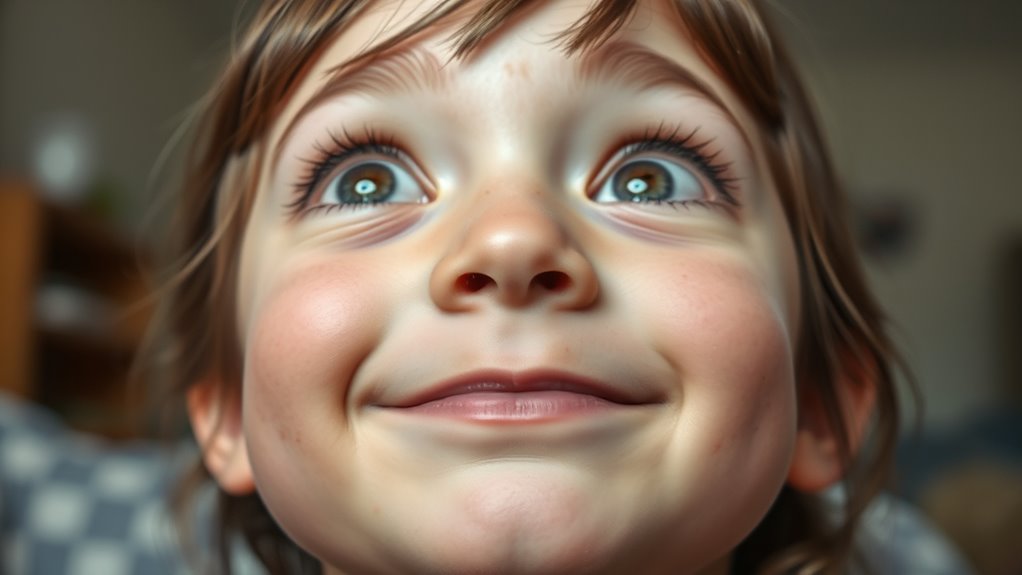
Recognizing when someone is using “delulu” in conversation often hinges on spotting playful or exaggerated remarks about unrealistic beliefs or fantasies. If you hear someone joking about their endless celebrity crushes or daydreaming habits that seem far-fetched, they might be describing themselves as “delulu.” Pay attention to signs like overly optimistic hopes or imagining unlikely scenarios. Some indicators include:
- Talking about believing they’ll meet a celebrity without reason
- Referring to intense daydreams as if they’re real plans
- Expressing unwavering faith in unlikely romantic outcomes
- Making exaggerated claims about their fantasies
These signals suggest someone’s embracing their “delulu” side, often in a humorous or lighthearted way. Recognizing these cues helps you understand when the conversation is playful versus serious. Being aware of realistic expectations can help you better interpret such behaviors and conversations.
The Impact of Fandoms on the Popularity of “Delulu”
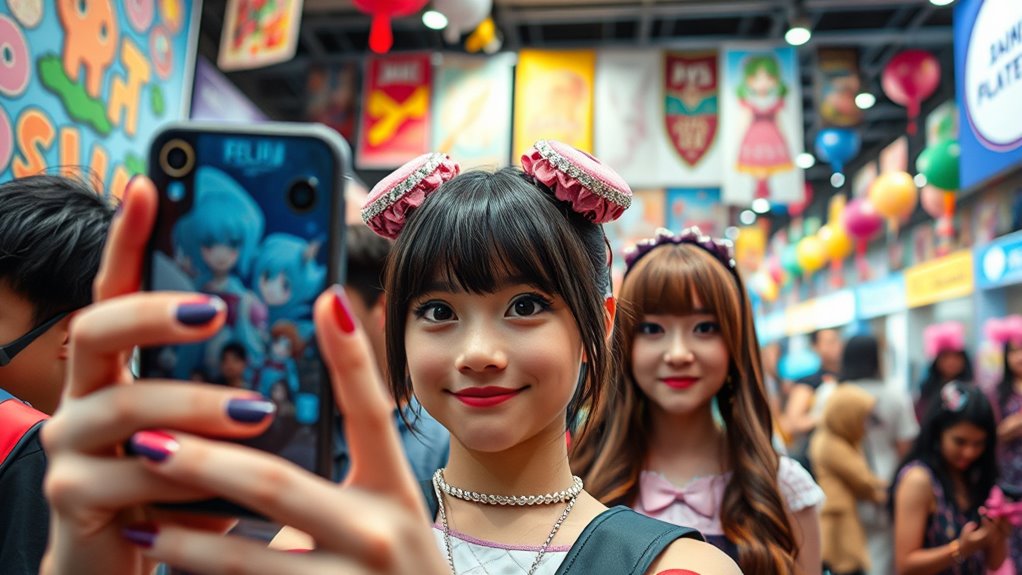
Fandoms play a significant role in fueling the popularity of “delulu” by creating a community where fans feel comfortable expressing their most imaginative and exaggerated beliefs about celebrities. This environment encourages fan enthusiasm, making it easier to share and amplify delulu ideas. Meme culture also contributes by turning these fantasies into humorous, relatable content that spreads rapidly across social media platforms. When fans see others joking or obsessing over unlikely scenarios, it normalizes and popularizes “delulu” behavior. As a result, the term gains traction beyond niche groups, becoming part of mainstream slang. Fandoms, through their collective energy and viral memes, foster a culture where delulu beliefs thrive, making it a prominent aspect of fan interactions and online conversations. Additionally, fan communities often use visual storytelling to creatively depict and support these delulu theories, further boosting their popularity.
Common Phrases and Contexts Featuring “Delulu”

Fans often use specific phrases and expressions to describe their delulu thoughts, making these ideas more relatable and shareable. In everyday fandom slang, you might hear phrases like:
- “I’m so delulu about this celebrity obsession.”
- “Totally living in delulu land right now.”
- “My delulu brain is running wild with fan theories.”
- “That’s pure delulu thinking, but I love it!”
These phrases highlight how fans humorously admit to their exaggerated or unrealistic fantasies about celebrities or ships. They often express how their delulu mindset fuels their passion, especially when obsessing over idols or fandoms. Using these common phrases, fans connect over shared delulu experiences, making these expressions a staple in fandom slang circles.
The Evolution of “Delulu” in Modern Slang

Over time, “delulu” has shifted from a niche term among dedicated fan culture communities to a widely recognized slang expression. Its evolution reflects how slang evolves with internet trends and social media, making it accessible beyond fandom circles. As more people used “delulu” to describe unrealistic fantasies or wishful thinking, it gained popularity in everyday conversations. This slang evolution shows how language adapts quickly, especially when it captures relatable behaviors like daydreaming or denial. Today, “delulu” is commonly understood across diverse social groups, highlighting how fan culture influences broader slang development. You now see “delulu” in memes, tweets, and casual chats, illustrating its journey from fandom jargon to mainstream slang. Additionally, the rise of cultural intelligence has contributed to understanding and navigating the social nuances behind such slang usage.
Frequently Asked Questions
Is “Delulu” Considered Offensive or Playful Slang?
You’ll find that “delulu” is generally playful slang, not offensive, but it’s context dependent. When used among friends to tease or joke about someone’s unrealistic dreams or ideas, it’s lighthearted and fun. However, if used harshly or in a disrespectful tone, it could feel offensive. Overall, it’s mostly seen as playful, but always consider the situation and tone to avoid misunderstandings.
Can “Delulu” Be Used in Professional or Formal Settings?
You shouldn’t use “delulu” in professional or formal settings, as it’s informal slang best suited for casual conversations. In appropriate formal usage, stick to clear, respectful language that conveys your message without slang. Consider the context carefully—what’s playful among friends may be inappropriate in a workplace or official communication. To maintain professionalism, avoid slang like “delulu” and opt for precise, conventional vocabulary.
How Has the Meaning of “Delulu” Changed Over Time?
You’ll notice that the meaning of “delulu” has evolved as slang reflects cultural shifts. Originally, it meant being overly delusional or disconnected from reality, often in a humorous way. Over time, it’s gained more nuanced uses, capturing how people sometimes cling to unrealistic hopes or fantasies. This evolving slang mirrors society’s changing attitudes toward mental health and optimism, making “delulu” a dynamic term that adapts with cultural trends.
Are There Similar Slang Words With the Same Meaning as “Delulu”?
You’ll find similar slang words with the same meaning as “delulu,” like “crazy” or “delusional,” but don’t expect them to carry the same nuance. Related informal terms like “overly optimistic” or “in denial” also pop up, often dripping with irony. These alternatives highlight the playful, exaggerated way people describe someone who’s wildly disconnected from reality, making the language both humorous and sharply pointed in social conversations.
Is “Delulu” Used Differently Across Various Age Groups?
You’ll notice that “delulu” is used differently across age groups, reflecting age-specific usage and generational slang differences. Younger people often use it casually to describe unrealistic fantasies or delusions, while older generations may not use it as much or might misunderstand its meaning. In social media, you’ll see it more among Gen Z and Millennials, highlighting how slang evolves and varies based on age and cultural context.
Conclusion
So, next time you catch yourself daydreaming about your bias, remember—you’re just being “delulu.” It’s funny how a silly slang can make your fantasies seem a bit more playful, right? But hey, if everyone’s “delulu” now, maybe reality isn’t so exciting after all. Embrace it, laugh at yourself, and enjoy the fun side of fandom. After all, who needs realism when you’ve got “delulu” dreams?
